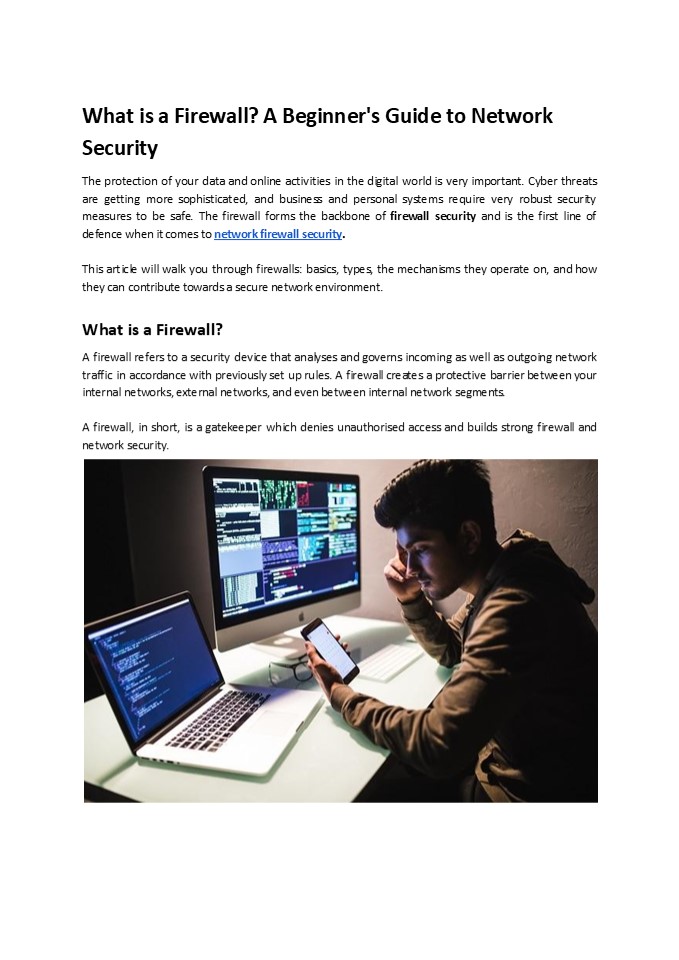What is a Firewall? A Beginner's Guide to Network Security
Title:
What is a Firewall? A Beginner's Guide to Network Security
Description:
The protection of your data and online activities in the digital world is very important. Cyber threats are getting more sophisticated, and business and personal systems require very robust security measures to be safe. The firewall forms the backbone of firewall security and is the first line of defence when it comes to network firewall security. –
Number of Views:2
Title: What is a Firewall? A Beginner's Guide to Network Security
1
What is a Firewall? A Beginner's Guide to Network
Security The protection of your data and online
activities in the digital world is very
important. Cyber threats are getting more
sophisticated, and business and personal systems
require very robust security measures to be safe.
The firewall forms the backbone of firewall
security and is the first line of defence when it
comes to network firewall security. This article
will walk you through firewalls basics, types,
the mechanisms they operate on, and how they can
contribute towards a secure network
environment. What is a Firewall? A firewall
refers to a security device that analyses and
governs incoming as well as outgoing network
traffic in accordance with previously set up
rules. A firewall creates a protective barrier
between your internal networks, external
networks, and even between internal network
segments. A firewall, in short, is a gatekeeper
which denies unauthorised access and builds
strong firewall and network security.
2
- Why Do You Need Firewall Security?
- Firewalls protect your sensitive data and user
anonymity, providing hassle-free working in
personal and professional life. That's why you
should pay attention to firewall security. - Against cyber threats
- By not admitting viruses, malware, ransomware,
and many such types of malicious entry to your
network. - Limit access only to the authorised user or his
device and prevent others from accessing the
network. Protect secret data therefore, it
avoids unauthorised traffic that may take place
from your network due to a breach in the data. - Increases productivity
- It restricts sites to visit as per employees such
that any risk of visiting bad sites gets
minimized with bad sites. - Firewalls analyze data packets or use advanced
techniques to monitor and control traffic based
on predefined rules. Those data packets carry all
details regarding their source and destination,
even the contents they carry. Firewalls filter
those data packets with the help of pre-decided
rules on whether they must be allowed or blocked. - Fire Walls Technique
- Packet filtering It is passing each data packet
for analyzing source IP, destination IP, and
protocol. - Proxy Service Acts as the middle level of filter,
which scans all the incoming and outgoing packets
to prevent the setting of connections between
network users on the Internet - Stateful Inspection-Keeps details of running
conversations to know whether it is a legal
request or denying acceptance of both Ends. - Next-Generation Firewall (NGFW)
- It has more sophisticated features such as
application awareness, intrusion prevention
systems, deep packet inspection, etc.
3
- Software Firewalls
- Software used on personal devices.
- This is very suitable for personal or small
networks. - It's flexible but has to be installed on multiple
devices. - Cloud-Based Firewalls
- Also known as Firewall-as-a-Service (FWaaS).
- Cloud-managed, suitable for distributed networks
or remote work. - Scalable and easy to configure.
- NGFW
- Traditionally, the functionality of a firewall
comes with the added features of deep packet
inspection and real-time threat intelligence. - Ideal for new, complex networks.
- Firewall Best Practices
- The best practices to gain the most from your
firewall and network security are listed below - Keep Rules Current
- The rules of the firewall must be audited and
updated because of the change in security
requirements.
4
- Popular Firewall Myths
- Firewalls Are Sufficient Individually
- Firewalls are part of the security equation, but
a good security plan takes more than just
firewalls antivirus software, encryption, and
employee education go into a solid security plan. - Firewalls Are a Plug-and-Play
- Firewalls must periodically be updated in order
to maintain the latest developments of threats. - Firewalls Choke Networks
- High-speed firewalls do not have any impact on
the speed of networks. - It can separate trusted networks of internal
systems from other probably untrusted networks of
an external system, which enables the passing of
legitimate traffic and blocks harmful data. - Do Small Businesses Really Need Firewalls?
- Firewalls have become a necessity to all
organisations irrespective of size, hence
providing protection for sensitive information,
preventing unauthorised access to information,
and ensuring smooth functioning. - When Should Firewall Rules Be Updated?
- Firewall rules need auditing and updating at some
point in time. They must be done once every six
months or times of change to your network
infrastructure. - Conclusion
- A firewall is an essential tool providing
firewall and network security. Whether you are an
end-user individual or an enterprise corporation,
understanding the mechanism behind the rules of
the firewall and installing the right system will
keep you safe in matters regarding your data
security and operational matters.































